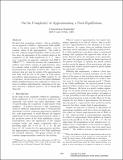On the complexity of approximating a nash equilibrium
Author(s)
Daskalakis, Constantinos
DownloadDaskalakis-On the complexity of approximating.pdf (1.147Mb)
PUBLISHER_POLICY
Publisher Policy
Article is made available in accordance with the publisher's policy and may be subject to US copyright law. Please refer to the publisher's site for terms of use.
Terms of use
Metadata
Show full item recordAbstract
We show that computing a relative---that is, multiplicative as opposed to additive---approximate Nash equilibrium in two-player games is PPAD-complete, even for constant values of the approximation. Our result is the first constant inapproximability result for the problem, since the appearance of the original results on the complexity of the Nash equilibrium [8, 5, 7]. Moreover, it provides an apparent---assuming that PPAD ⊈ TIME(n[superscript O(log n)])---dichotomy between the complexities of additive and relative notions of approximation, since for constant values of additive approximation a quasi-polynomial-time algorithm is known [22]. Such a dichotomy does not arise for values of the approximation that scale with the size of the game, as both relative and additive approximations are PPAD-complete [7]. As a byproduct, our proof shows that the Lipton-Markakis-Mehta sampling lemma is not applicable to relative notions of constant approximation, answering in the negative direction a question posed to us by Shang-Hua Teng [26].
Date issued
2011Department
Massachusetts Institute of Technology. Computer Science and Artificial Intelligence LaboratoryJournal
Proceedings of the Twenty-Second Annual ACM-SIAM Symposium on Discrete Algorithms (SODA '11)
Publisher
Society for Industrial and Applied Mathematics
Citation
Constantinos Daskalakis. 2011. On the complexity of approximating a Nash equilibrium. In Proceedings of the Twenty-Second Annual ACM-SIAM Symposium on Discrete Algorithms (SODA '11). SIAM 1498-1517. SIAM ©2011
Version: Final published version
ISSN
1071-9040